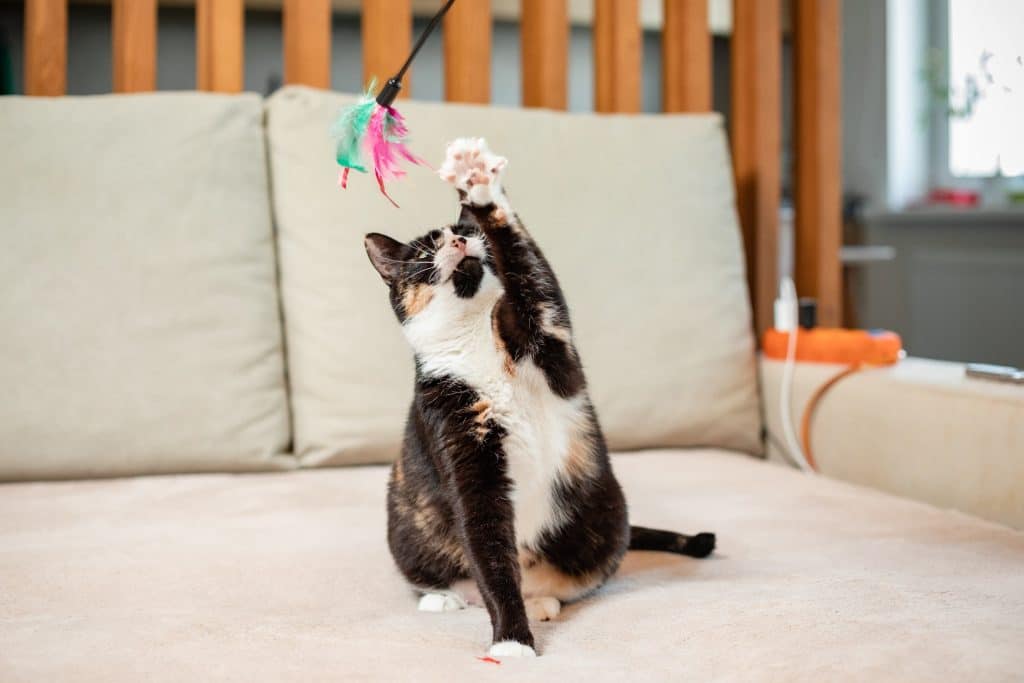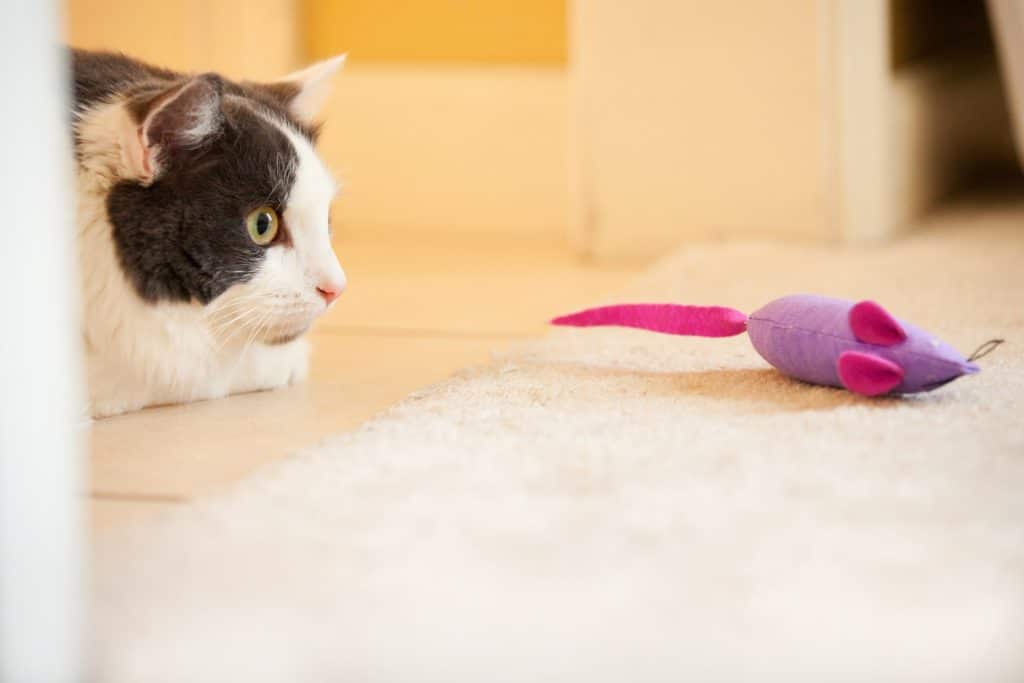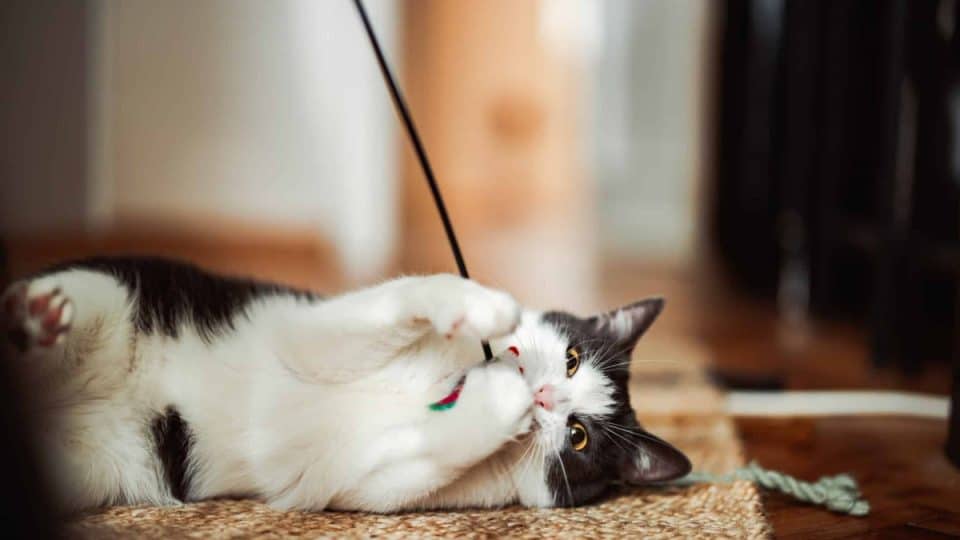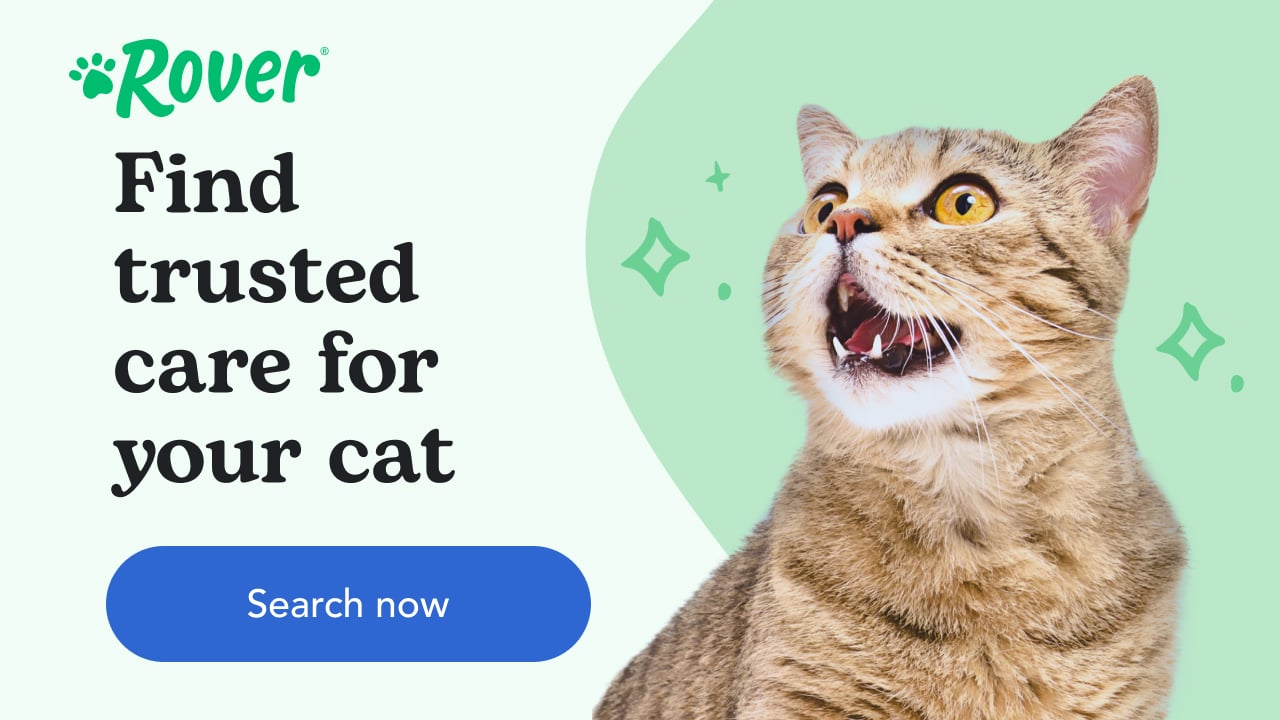When your cat brings you their ‘prey’ do you think: “aw, sweet”, or “ew, gross!”? We bet the answer depends on if the offering is a toy mouse or a real one. Most cat parents are likely familiar with this odd yet enduring behaviour—among your cat’s many other antics.
Generally, cats bring you toys because they are bored and want to play. Other times, a cat delivering a toy to you is just their way of saying “I love you”. Here’s more insight about why cats bring you toys and what to do when the gift isn’t one you want inside the house.
They’re Bored & Want To Play
Pet parents should aim to play with their cats at least once a day, says Samantha Bell, cat expert at the Best Friend’s Animal Society. Cats get bored when there’s a lack of activity and attention. One of the biggest signs your cat is bored? They might bring you toys and meow as a not-so-subtle reminder to play with them.
But, Bell adds, cats also get bored when they’re unable to hunt—they need to feel like real predators in the wild. “Play with your cat, completing the hunting sequence of hunt, catch, and kill at least once a day,” Bell says. “When a cat is unable to satisfy their prey drive you may see their prey drive manifest in undesirable behaviours like biting or attacking others.”

iStock/Alexander Shelegov
They’re Expecting a Reward
Does your cat bring toys to your bed at night? Cats are crepuscular, which means they are most likely to hunt at dawn and dusk. If your cat drops their favourite toy in bed at night and meows at you, you might pet your cat, set them aside, or even toss the toy. All these actions are positive reinforcement, signalling to your cat that they’ll be rewarded with attention for bringing a toy to bed.
“Cats associate your shared presence with their toys as a sign they will get to play. Once they learn this relationship, they might instigate play by bringing the toys to you,” says Dr Mikel Delgado, a cat behaviour expert and consultant at Feline Minds.
Fun fact: This reward-based behaviour isn’t just reserved for nighttime!
They Want You To Look After The Toy
When cats hunt in the wild, their instincts are to move their catch to a safe place away from predators and competition, Dr Delgado says. They might not eat their catch right away and instead leave it in a safe spot to eat later. Cats see their pet parents as safe and trustworthy, so they give you their toy to look after.
Cats (even the cutest of kittens) are hard-wired to hunt and keep their possessions safe. After all, it’s their hunting instincts that found them a place in human homes some 10,000 years ago. That’s why you might also find toys hidden in your cat’s favourite spots—like under the bed, in your clothes, and sometimes in their water or food bowl.
They’re Teaching You How To Hunt
Let’s face it, you’re not great at hunting mice and your cat noticed. If your cat brought you a toy or a gift from outside, they may be replicating mother-kitten instincts. “In the wild, mom cats teach their young how to hunt and eat their food by bringing home dead or injured prey,” Dr Delgado explains.

iStock/sdominick
They Want You To Investigate The Toy
If your cat’s favourite toy looks or smells different, they might bring it to you to inspect it. Your cat’s toy might have loose strings, stuffing falling out, or other components sticking out. If your cat’s toys have any loose string, yarn, streamers, floss, or any other parts that can be swallowed, Bell says to toss them before your cat has a chance to ingest the loose parts. “Once a cat swallows the end of the string, rhythmical contractions move it along the digestive tract where it can get tangled in their intestines and become fatal,” she says.
They’re Showing Their Love For You
One of the not-so-tell-tale signs of a cat’s affection is entrusting you with their catch. Whether they wanted to teach you how to hunt, are asking to play, or want you to look after their prey—they downright trust and love you. Some cat breeds show this kind of affection more than others, including Ragdolls and Siamese cats.
Regardless of the reason, when cats bring you toys, they are showing you affection and how important you are to them.

iStock/Moyo Studio
What To Do If My Cat Brings Me Dead Animals or Other “Inappropriate Gifts”?
If your cat brings you a dead or alive but injured animal, it’s important not to scold them. Your cat is simply playing out their instinct, and frankly, they’re not good gift-givers. Instead, let your cat know they did a good job being a cat and focus on healthy ways to satisfy their hunting instincts.
In an interview with NPR’s Fresh Air, John Bradshaw, an expert on the relationship between pet parents and their cats, says that there are several approaches to curving your cat’s hunting spree—starting with keeping your cat indoors or restricting their access to the outdoors when wildlife is most active. Then, try these tips:
- Feed your cat high-quality food that meets their calorific needs.
- Outfit your cat in a breakaway collar with a bell.
- Play with your cat (hunt, catch, and ‘kill’) at least once a day. End the play session by giving your cat a treat, snack, or meal to complete the predatory cycle.
What Types of Toys Should I Give My Cat?
There are many different types of cat toys, and it’s important to provide them with variety. Finding your cat’s prey or play preference can take trial and error, and it’s good to rotate toys to avoid boredom.
- Wand Toys. According to Bell, wand toys are one of the best choices when replicating the movement of real prey. Plus, she adds, it’s much more satisfying for your cat to play with you than by themselves. “Make the toy move how the prey would,” she says.
- Laser Pointers. Laser toys with the little red light are great for kitty cardio (and laughs for us) but can’t be caught. “So, if you only do laser time and then walk away from your cat, they don’t get to complete the full hunting sequence of ‘hunt, catch, kill’”. To prevent this, Bell says to end laser play with wand play, allowing your cat to catch the prey. Or, she suggests, point the laser at a treat so your cat can eat their catch!
- Puzzle Toys. Puzzle toys encourage independent play and provide mental stimulation while mimicking a cat’s natural hunting and foraging instincts. There are lots of cat puzzle toy options, so you’re sure to find one that fits your cat’s preferences.
- Interactive Toys. Varying in movement and materials, enrichment toys offer a full-body experience to hunt, catch, and ‘kill’ prey. When considering the best interactive toy for your cat, think about what gets your cat most excited—from treats, feathers, and prey-like movements.
- Catnip Toys. Catnip works like this: the plant releases chemicals meant to keep insects away. These chemicals happen to mimic a cat’s pheromones which triggers a positive emotional and behavioural response. Not all cats react to catnip. But if your does, they might enjoy the enrichment of catnip kickers, scratchers, and more.

iStock/Svetlana Popova
Most importantly, Bell says you should never use your hands or other body parts to play with cats because they can confuse your body as something to attack. “You don’t want them thinking of people as prey and something to bite or attack,” Bell says.
Takeaway About Cats Bringing You Toys
Playing with your cats is one of the best parts of being a cat parent. “Playing with your cat is so much more than just exercise, it’s also wonderful physical and mental enrichment and a fantastic way to bond with your cat,” Bell says.
One of their cutest behaviours when playing is bringing you a toy. Understanding your cat’s behaviours is truly gratifying. Not only are we able to pick up on subtle signs of affection (like the slow blink), but we can learn how to better interact and satisfy our cat’s needs. Maybe your cat isn’t a skilled hunter or has a less enthusiastic hunting drive—with the right information, we bet you’ll spot many other ways your cat says, “I love you”.


